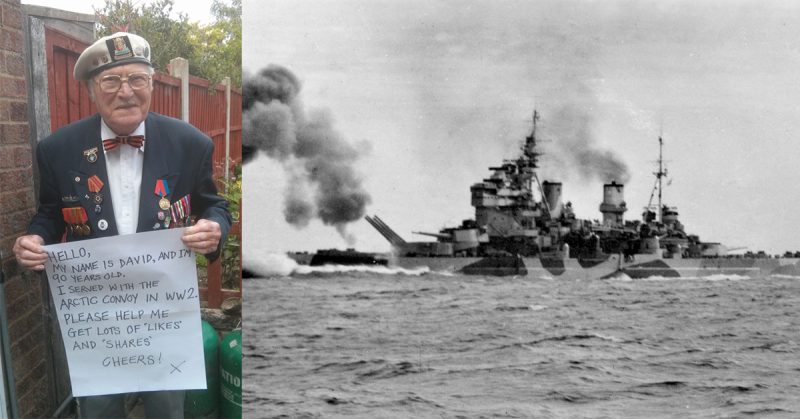Tam Neal, a piano teacher in London, posted a picture of his father-in-law, David Kennedy, 90, on Facebook. He added a caption to the picture of the WWII Arctic Convoy veteran: “Let’s see how many likes and shares we can get for the old fella.”
After racking up more than 150,000 likes, 45,000 shares, and 7,000 comments later, Tam has said that he was overwhelmed by the response received by the photo. Kennedy is touched and a bit bemused at the attention. He’s not particularly adept at social media, but his wife has been reading some of the comments to him.
“What amazed us is when people started uploading photographs of their own family members who were also veterans, and all their stories as well,” Tam said.
Tam said that the response got “very big” once it hit Russia; the Russian people idolize these guys from the Arctic Convoys.
“Only three or four years ago did these guys finally get recognized and presented with a medal, from the British Government. The Russians have been feting them for years with accolades and medals. Because it’s taken so long for the British Government to recognize them, a lot of them are dead, and families had to apply retrospectively to get these medals posthumously.”
The Arctic Convoys played a huge role in the Allied victory over the Nazis in WWII. They kept up vital supply lines between the UK, Iceland, and the U.S.
There were 78 convoys run between August 1941 and May 1945. They were escorted by ships from the Royal Navy, Royal Canadian Navy, and the US Navy. The convoys made up almost 25% of all the aid to the USSR during the war.
The Arctic route was the quickest way to get aid to the Russians; it was also the most dangerous. This August is the 75th anniversary of the first Arctic Convoy.
“Arctic Convoys was an inspiring symbol of the Soviet-British friendship and brotherhood-in-arms that were forged between our nations during the war. Soviet, British, American vessels brought many supplies to Russia and back. They were actively defending the lines from the enemy, and our sailors and pilots fought bravely together in the Arctic theater,” said Andrey Pritsepov, the Consul General of Russia in Edinburgh.
“I am delighted that people around the globe are aware of what they did and show their respect and admiration to the veterans who fought with great bravery and to those who sacrificed their lives for our joint victory.”
